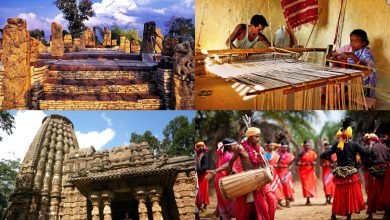
National Anthem Of India – Jana Gana Mana
“Jana Gana Mana (जन गण मन)” is the national anthem of India.  The Indian National anthem was originally composed in Bengali and scored by Rabindranath Tagore. It was first sung in Calcutta Session of the Indian National Congress on 27 December 1911. “Jana Gana Mana Adhinayak” was officially adopted by the Constituent Assembly as the Indian national anthem on 24 January 1950.
The Indian National anthem was originally composed in Bengali and scored by Rabindranath Tagore. It was first sung in Calcutta Session of the Indian National Congress on 27 December 1911. “Jana Gana Mana Adhinayak” was officially adopted by the Constituent Assembly as the Indian national anthem on 24 January 1950.
The original poem written by Rabindranath Tagore was translated into Hindi by Abid Ali.The original Hindi version of the song Jana Gana Mana, translated by Ali and based on the poem by Tagore, was a little different. It was “Sukh Chain Ki Barkha Barase, Bharat Bhagya Hai Jaga.”. After Independence of India from British rule, it was officially adopted by the Constituent Assembly as the Indian national anthem on 24 January 1950.
The complete song consists of five stanzas. Playing time of full version of the National Anthem is approximately 52 seconds.27 December 2011 marked the completion of 100 years of Jana Gana Mana since it was sung for the first time.
The song comprises the lyrics and music of the first stanza of the Nobel laureate poet Rabindranath Tagore’s “Jana Gana Mana” written in praise of India. Below are the words of India’s national anthem:
| जन गण मन अधिनायक जय हे भारत भाग्य विधाता । पंजाब सिंध गुजरात मराठा द्रविड़ उत्कल बंग। विंध्य हिमाचल यमुना गंगा, उच्छल जलधि तरंग। तव शुभ नामे जागे, तव शुभ आशिष मागे, गाहे तव जय गाथा । जन गण मंगलदायक जय हे, भारत भाग्य विधाता । जय हे, जय हे, जय हे, जय जय जय जय हे ॥ |
Jana-gana-mana-adhinayaka, jaya he Bharata-bhagya-vidhata. Punjab-Sindh-Gujarat-Maratha Dravida-Utkala-Banga Vindhya-Himachal-Yamuna-Ganga Uchchala-Jaladhi-taranga. Tava shubha name jage, Tava shubha asisa mage, Gahe tava jaya gatha, Jana-gana-mangala-dayaka jaya he Bharata-bhagya-vidhata. Jaya he, jaya he, jaya he, Jaya jaya jaya, jaya he! |
Tagore himself translated Jana-gana-mana into English which reads as follows:
Thou art the ruler of the hearts of all people,
Dispenser of India’s fortune.
Thy name rouses the hearts of the Punjab,
Sind, Gujarat, and Maratha,
Of the Dravida, and Odhisha and Bengal.
It echoes in the hills of Vindhyas and,
Himalayas, mingles in the music of the
Yamuna and the Ganges and is chanted by
the waves of the Indian sea.
We pray for your blessings,
and sing by your praise,
The saving of all people
waits in thy hand.
Thou dispenser of India’s fortune,
Victory, victory, victory to thee.
Code of conduct
The National Anthem of India is played or sung on various occasions. whenever the national anthem is sung or played live, the audience should stand in attention position. It cannot be indiscriminately sung or played randomly. The full version should be played accompanied by mass singing on the unfurling of the National Flag, on cultural occasions or ceremonial functions, and on arrival of the President of India at any government or public function and also immediately before his departure from such functions.
National Anthem of India जन गण मन in Devnagri
जन गण मन अधिनायक जय हे
भारत भाग्य विधाता ।
पंजाब सिंध गुजरात मराठा
द्रविड़ उत्कल बंग।
विंध्य हिमाचल यमुना गंगा,
उच्छल जलधि तरंग।
तव शुभ नामे जागे,
तव शुभ आशिष मागे,
गाहे तव जय गाथा ।
जन गण मंगलदायक जय हे,
भारत भाग्य विधाता ।
जय हे, जय हे, जय हे,
जय जय जय जय हे ॥
National Anthem Of India Jana Gana Mana in Romanized Hindi
Jana-gana-mana-adhinayaka, jaya he
Bharata-bhagya-vidhata.
Punjab-Sindh-Gujarat-Maratha
Dravida-Utkala-Banga
Vindhya-Himachal-Yamuna-Ganga
Uchchala-Jaladhi-taranga.
Tava shubha name jage,
Tava shubha asisa mage,
Gahe tava jaya gatha,
Jana-gana-mangala-dayaka jaya he
Bharata-bhagya-vidhata.
Jaya he, jaya he, jaya he,
Jaya jaya jaya, jaya he!






